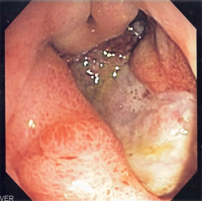 Image via Wikipedia
Image via WikipediaEradicating a common bug in people with stomach cancer can prevent the disease from recurring, research suggests.
Helicobacter pylori, proved to be the cause of most stomach ulcers, has also been linked with stomach cancer
In a study of 550 people who had stomach cancer surgery, antibiotics which killed the bug cut the risk of a second cancer developing by two-thirds.
” Preventing gastric cancer by eradicating H. pylori in high-risk regions should be a priority” Says Dr Nicholas Talley
There will now be a trial of 56,000 British people to see if killing the bacterium stops the cancer developing.
H. pylori lives in the stomach, and accounts for up to 90% of duodenal ulcers and up to 80% of gastric ulcers.
It was famously linked with stomach ulcers by two Australian researchers – one of whom deliberately infected himself to prove the theory – who were awarded the Nobel prize for their discovery in 2005.
The World Health Organisation also classes the bacterium as a leading cause of stomach cancer.
Prevention :
Previous trials on eradicating H. pylori as a method of preventing further stomach cancers in patients who have undergone surgery have been conflicting.
But the latest study, done in Japan, found that the strategy could be very useful.
Patients with early stomach cancer underwent a procedure to remove the cancerous cells and surrounding tissue.
Half of them were then treated with a course of drugs designed to eradicate H. pylori – lansoprazole, amoxicillin and clarithromycin – and half received dummy pills and were then examined at six, 12, 24 and 36 months to see if the cancer had reappeared in a different site.
After three years, a second stomach cancer had developed in nine patients in the eradication group compared with 24 in the control group.
Overall, the risk of developing cancer was reduced by 65% with H. pylori treatment.
Study leader Dr Mototsugu Kato, from Hokkaido University Graduate School of Medicine said: “We believe that our data add to those from previous studies showing a causal relationship between H. pylori infection and gastric cancer, and also support the use of H. pylori eradication to prevent the development of gastric cancer.”
Writing in the same issue of The Lancet, Dr Nicholas Talley, of Mayo Clinic Jacksonville, Florida, US said: “Preventing gastric cancer by eradicating H. pylori in high-risk regions should be a priority.”
Henry Scowcroft, science information manager at Cancer Research UK, said: “This result adds to our understanding of the relationship between H pylori and stomach cancer, and to the debate on how we should treat people with this infection.
He added the charity was helping to fund a study to assess whether elimination of the bacteria could prevent cancer developing.
“The trial aims to recruit 56,000 people across the UK, treat any who show signs of H pylori infection, and follow them over 15 to 20 years to see if this treatment is effective.”
Disclaimer: This information is not meant to be a substitute for professional medical advise or help. It is always best to consult with a Physician about serious health concerns. This information is in no way intended to diagnose or prescribe remedies.This is purely for educational purpose.
Sources: BBC NEWS:31st.July.’08
Related articles by Zemanta
- Mastic Gum and Bio-hpf – Natural Support for H. Pylori & Gastrointestinal Ulcers
- Gut Reaction: An Ulcer-Causing Bug May also Help Prevent Asthma [News]
- 20,000 Die Every Year From Cancer
- Researchers offer to bring N.W.T. stomach bacteria study to Yukon
- Stomach Bug May Ward Off Asthma [60-Second Science]













